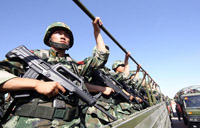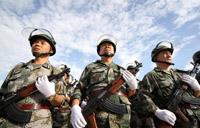Xinjiang mulls anti-terrorism laws
By CUI JIA (China Daily) Updated: 2014-02-28 00:38Legislation 'needed to deal with increasing number of attacks'
 |
 |
It is the first time that anti-terrorism laws have been listed on the regional legislature's work plan, the official said.
"The legislation is in the second phase of this year's legislative work plan, which means it is under discussion regarding feasibility and impact," said Bo Xiao, director of the legislative affairs commission of Xinjiang Regional People's Congress Standing Committee.
Bo said it is difficult to predict when the legislation can be enacted, as some bills in this category could be drafted within a year, while others could take longer, possibly years.
Rezwan Ayouf, deputy director of the legislative affairs commission, said during a group discussion at the regional people's congress' annual session in January that current legislation needs to be upgraded.
"At the moment, all terror-related crimes in Xinjiang are dealt with under the Criminal Law, which we found was sometimes inadequate," she said, adding that one of the most difficult aspects of drawing up legislation concerns the precise legal definition of terrorism.
Shan Chunchang, a specialist in emergency management for the State Council, who is also deputy director of the National Commission of Disaster Reduction's Expert Committee, said China does not have specific anti-terrorism legislation and this should be addressed.
To date, no national anti-terrorism law has been listed in the legislative work plan of the National People's Congress, the country's top legislature.
Liu Renwen, director of the department of criminal law at the Law Institute of the Chinese Academy of Social Sciences, said, "The increasing number of terrorist attacks has become a major issue for Xinjiang.
"Drafting a regional anti-terrorism regulation, especially identifying terrorist activities in the region, is crucial for the authorities to combat such crimes."
On Oct 29, 2011, the Standing Committee of the NPC passed the Decision on Issues Related to Strengthening Anti-Terrorism Work. This clarified definitions of terrorist activities, terrorist organizations and terrorists. It also provided lists of terrorist organizations and terrorists.
Liu said, "China has been considering drafting a comprehensive anti-terrorism law since the September 11 attacks in the United States in 2001, but consensus on certain issues was difficult to reach and the 'decision' was the result of that."
China adopted an amendment to the Criminal Law on Dec 29, 2001, which aims to "punish the crimes of terrorism, to safeguard the security of the State and maintain public order".
The move came as anti-terrorism efforts worldwide were stepped up and China faced constant threats from terrorist organizations such as the East Turkestan Islamic Movement, listed as a terrorist group by the United Nations.
The group was behind a suicide attack in Beijing on Oct 28. Five people, including three attackers, were killed and another 40 injured after a jeep, driven by Usmen Hasan and carrying his mother and wife — all from Xinjiang — crashed into a crowd in Beijing's Tian'anmen Square.
Liu said anti-terror legislation must be drafted carefully to protect people's rights.
Terrorists in Xinjiang have become more active and their attacks more frequent, with two already occurring this year, on Jan 14 and Feb 14.
"What Xinjiang needs is a regulation that can effectively impede potential terrorism," Liu said.
Gao Bo in Urumqi contributed to the story.
- More female officials caught in corruption
- Whampoa veterans recorded with glory
- Police bust 9 terrorist groups in Xinjiang
- Knife-wielding attackers seized in Xinjiang
- New regulation leads to drop in petitioned cases
- Hunan plant shut as probe into lead poisoning begins
- Police boost efforts to combat gambling
- Project offers jobs openings to legal experts
- Experts: Dog meat festival 'illegal'
- Nation looks to upgrade
pipeline networks






